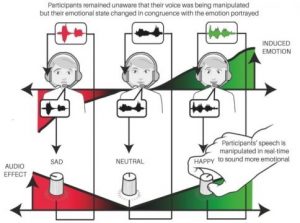The sound of you voice impacts your mood
January 11, 2016
Have you ever listened to a depressed person speak? Monotone. Slow paced. Lacking confidence. No excitement or urgency. Now imagine the voice of a happy person – faster rate, higher pitch, excited, and more variation in tone. It turns out these differences in the sound of your voice impact your own mood. So if you want to change how you feel, change your voice. Speak as if you are happy (assuming you want to be happier!).
Researchers at the French National Centre for Scientific Research (CNRS), have created a new digital audio platform that changes the emotional tone of people’s voices on the fly, as they speak. This software can make them sound happier, sadder or more anxious. Research indicates that while listening to their altered voices, as they are talking, participants’ moods change to match the new emotion.
We know very little about the voice and it’s impact on our feelings. So the question arose, what sort of awareness do people have of their own emotional vocal expressions and what impact do they have on how we feel?
First, participants in the study read a short story out loud while hearing their own voice, digitally altered to sound happier, sadder or more anxious, through a headset.
Results indicate that participants were not aware that their voices were being digitally manipulated, yet their mood changed to match the emotion the researchers had dialed up. It seems that people do not always control the emotional tone of their own voice to meet a certain goal and that people listen to their own voice to verify how they are feeling.
One of the researchers, Petter Johansson, from Lund University, Sweden, stated, ”This is the first evidence of direct feedback effects on emotional experience in the auditory domain.”
The emotional manipulations were created by new software that simulates auditory components of emotional vocalizations. For example, the happy voice modification increases the pitch of a speaker’s voice to make it sound more positive, increases its dynamic range using compression to make it sound more confident, and modifies its spectral content to make it sound more excited.

To learn how to manage your anxiety, check out Dr. John’s 6 week online course – How Can I Get Rid of Anxiety
This novel audio platform appears to open up many new areas of experimentation.
“Previously, this kind of emotion manipulation has not been done on running speech, only on recorded segments,” explains Jean-Julien Aucouturier. “We are making a version of the voice manipulation platform available as open-source on our website, and we invite anyone to download and experiment with the tools.”
For applications outside academia, co-author Katsumi Watanabe from Waseda University considers that the platform could be used therapeutically, for example to help those with mood disorders by inducing positive attitude change by retelling emotionally laden events in a modified tone of voice.
Journal Reference:
1Jean-Julien Aucouturier, Petter Johansson, Lars Hall, Rodrigo Segnini, Lolita Mercadié, Katsumi Watanabe. Covert digital manipulation of vocal emotion alter speakers’ emotional states in a congruent direction. Proceedings of the National Academy of Sciences, 2016; 201506552 DOI: 10.1073/pnas.1506552113


Recent Comments